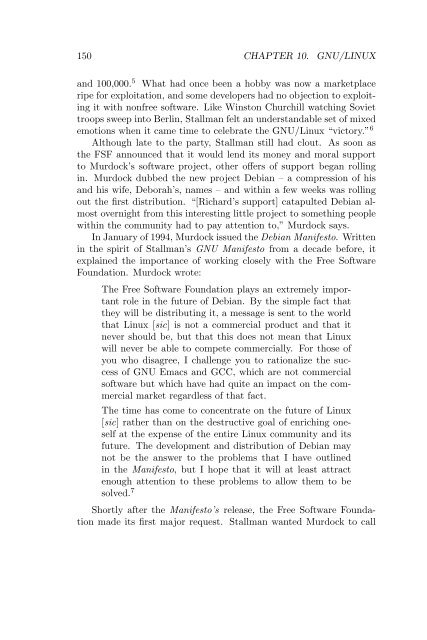Create successful ePaper yourself
Turn your PDF publications into a flip-book with our unique Google optimized e-Paper software.
150 CHAPTER 10. GNU/LINUX<br />
and 100,000. 5 What had once been a hobby was now a marketplace<br />
ripe for exploitation, and some developers had no objection to exploiting<br />
it with nonfree software. Like Winston Churchill watching Soviet<br />
troops sweep into Berlin, Stallman felt an understandable set of mixed<br />
emotions when it came time to celebrate the GNU/Linux “victory.” 6<br />
Although late to the party, Stallman still had clout. As soon as<br />
the FSF announced that it would lend its money and moral support<br />
to Murdock’s software project, other offers of support began rolling<br />
in. Murdock dubbed the new project Debian – a compression of his<br />
and his wife, Deborah’s, names – and within a few weeks was rolling<br />
out the first distribution. “[Richard’s support] catapulted Debian almost<br />
overnight from this interesting little project to something people<br />
within the community had to pay attention to,” Murdock says.<br />
In January of 1994, Murdock issued the Debian Manifesto. Written<br />
in the spirit of Stallman’s GNU Manifesto from a decade before, it<br />
explained the importance of working closely with the Free Software<br />
Foundation. Murdock wrote:<br />
The Free Software Foundation plays an extremely important<br />
role in the future of Debian. By the simple fact that<br />
they will be distributing it, a message is sent to the world<br />
that Linux [sic] is not a commercial product and that it<br />
never should be, but that this does not mean that Linux<br />
will never be able to compete commercially. For those of<br />
you who disagree, I challenge you to rationalize the success<br />
of GNU Emacs and GCC, which are not commercial<br />
software but which have had quite an impact on the commercial<br />
market regardless of that fact.<br />
The time has come to concentrate on the future of Linux<br />
[sic] rather than on the destructive goal of enriching oneself<br />
at the expense of the entire Linux community and its<br />
future. The development and distribution of Debian may<br />
not be the answer to the problems that I have outlined<br />
in the Manifesto, but I hope that it will at least attract<br />
enough attention to these problems to allow them to be<br />
solved. 7<br />
Shortly after the Manifesto’s release, the Free Software Foundation<br />
made its first major request. Stallman wanted Murdock to call


